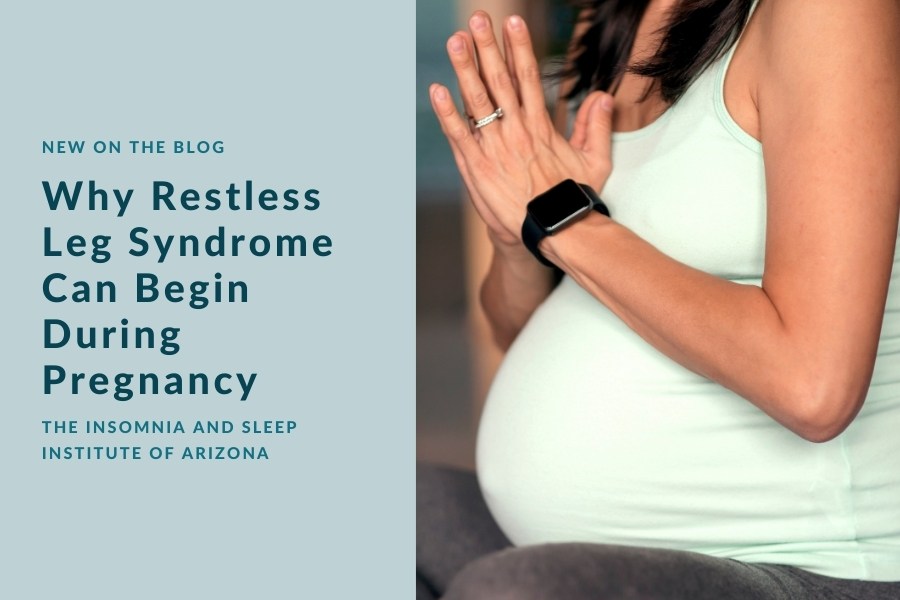It is estimated that up to 10 percent of U.S. adults have Restless Leg Syndrome (RLS) and that some experience onset during pregnancy. The Insomnia and Sleep Institute of Arizona treats all types of sleep and sleep-related disorders, including RLS. Staffed by sleep specialists who concentrate on sleep medicine, you will enjoy access to leading professionals in the field including three clinical psychologists. Proud to be the Face of Sleep Medicine in the Phoenix region, we are outcome-driven which means getting patients the right diagnosis. This is why every consultation is with a sleep expert who can diagnose disorders, ensuring testing and treatment can commence.
If you are pregnant and have experienced what seems to be RLS, you are not alone. This is a common occurrence, but there are also associations with RLS and age, ethnicity, and nutritional factors. A study recently published in Neurology found in a study from 2009 – 2013 that pregnant women indeed tend to have RLS at higher rates than non-pregnant people, but there are a myriad of additional factors affecting these figures.
Pregnancy and Restless Leg Syndrome
The study included women 8 – 13 weeks pregnant and volunteers required 5 follow-up appointments. There was a total of 2,056 participants who completed all 5 visits. The average age was 28.1 years old and 39.4 percent of participants had at least a bachelor’s degree. Additionally, 25.5 percent made under $30,000 per year. Of the participants, those of Asian descent had the lowest BMI while Hispanic women had the highest. However, Black participants reported the highest pre-pregnancy weight as well as anemia rates.
In total, 18.1 percent of participants said they had RLS. There were differences based on ethnicity. Restless leg syndrome showed to be most prevalent in Asian women at 21.1 percent, white women reported RLS at 20.3 percent, Hispanic women at 17.1 percent, and Black women at 15.4 percent. The incidence rate peaked at 24 – 29 weeks gestation and then lowered dramatically at 38 – 41 weeks gestation. Those who reported RLS also had an increase in subcutaneous fat at a disproportionate rate compared to others in the cohort. Those with the lowest risk had previous multiple pregnancies.
Why Treating RLS is Important
Even for those who might develop “gestational” RLS, getting help for this sleep disorder is important. Like any sleep disorder, RLS can interfere with getting enough quality sleep, which is critical for anyone but particularly pregnant people. There is no need for a referral to be seen at The Insomnia and Sleep Institute. There is also a myriad of methods to help with RLS for pregnant people, and prescribed medications are not necessarily the best approach for all. From cognitive-behavioral therapy to changes in sleep hygiene, you have options to reduce Restless Leg Syndrome (whether you are pregnant or not).
It is also important to note that RLS does not always exclusively present in the legs (although that is the most common). If you think that RLS is present in other parts of the body, such as the arms, that can be a sign that the disorder is worsening. If you suspect you have any type of sleep disorder, the sooner you receive a correct diagnosis from a sleep expert, the sooner treatment can begin.
Getting Help for Sleep Disorders
Many sleep disorders, including RLS, are relatively common. However, just because a disorder is highly prevalent does not mean that it is not important to treat. Sleep disorders can be harmful and damaging to every facet of your life. Being chronically fatigued and sleep deprived is connected to a host of issues. Those who are routinely sleep deprived have higher rates of heart disease and stroke, reporting that their professional and personal lives also suffer. Ultimately, if you’re not getting the sleep you need, you will pay in other ways—for pregnant people, that is simply a risk that cannot be taken.
If you’re ready to get a diagnosis and treatment for RLS or any other sleep disorder, connect with The Insomnia and Sleep Institute today. You can call the office or, for the quickest reply and consultation scheduling, fill out the contact form today.





